Inside Trump Nation: Virginia voter, struggling to make ends meet, finds a voice with take-charge Donald Trump
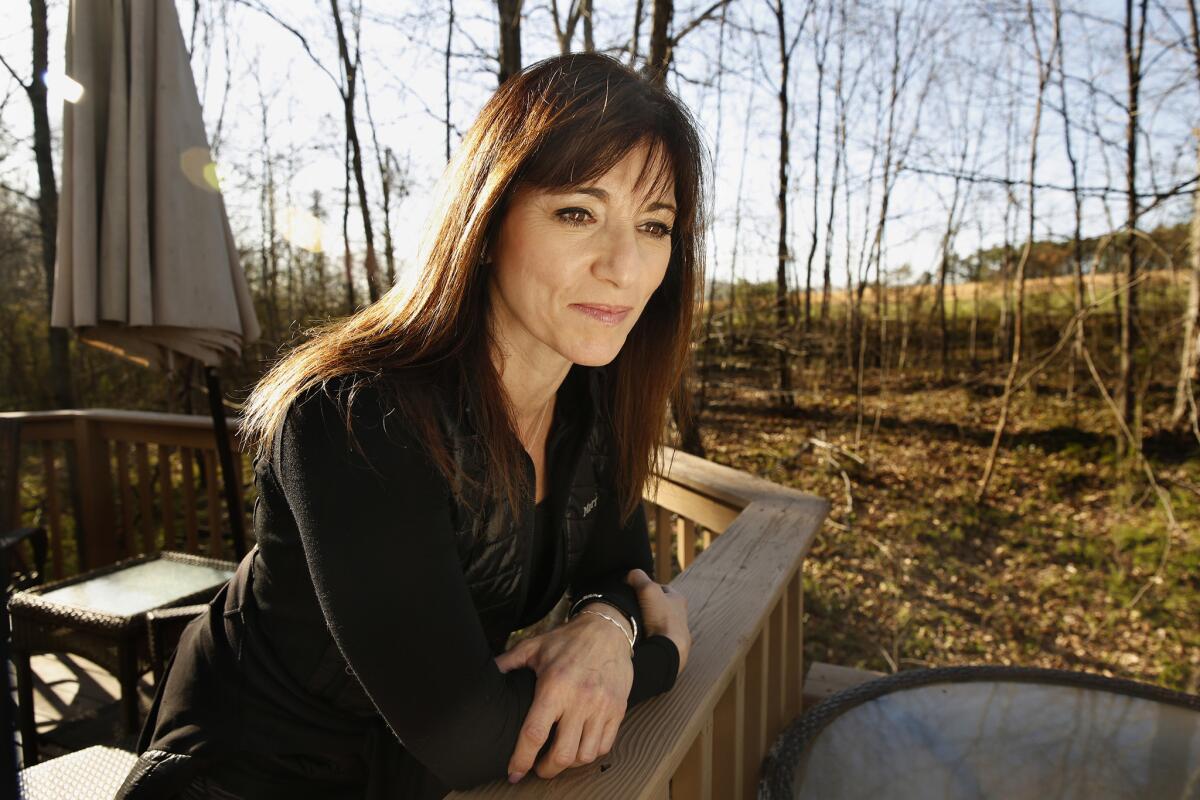
Peggy Hayes, who lives just outside of Fredericksburg, Va., is a self-employed personal trainer. She supports Donald Trump for president.
- Share via
Peggy Hayes is professionally upbeat. A personal trainer, she teases clients about the pain that awaits them and hands out calling cards that read: “Clear your mind of can’t.”
Yet beneath her motivational smile lies something much less confident, and it’s had a deep impact on her political views.
Lately, so many prospective clients have been canceling their training sessions that the owner of a gym where she works has started calling her “Bad Luck Peggy.”
Hayes, 53, offers free consultations and shows clients how to make protein shakes with egg whites instead of expensive powder. For those who can’t afford her, she is sympathetic: She herself doesn’t have the money for health insurance.
People like her are living day to day, she said, focused on the most important things: “Taking care of your health, putting food on the table and a roof over your head.”
"It’s hard to be able to think about entertainment or retirement when I’m not even here with healthcare,” she said.
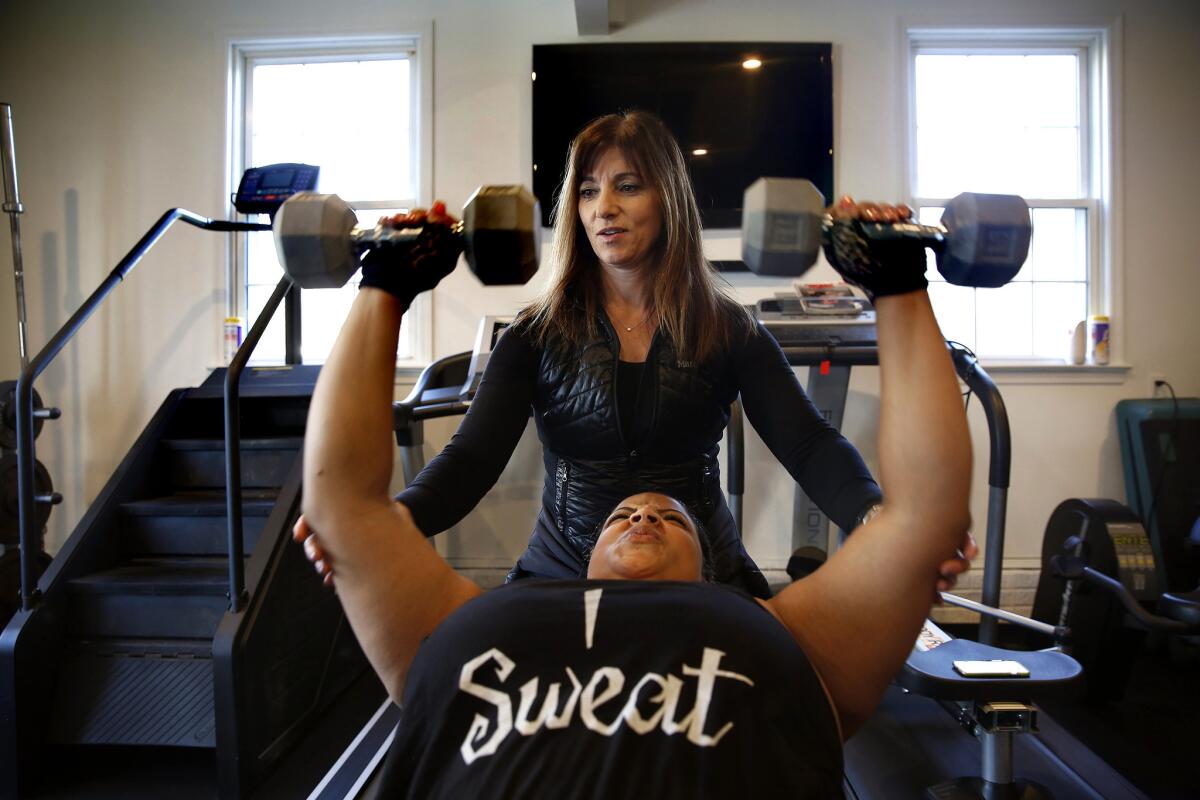
The leafy neighborhoods of Spotsylvania County, an hour’s drive out of Washington, are spotted with Civil War battlefields and milestones of American history: Stonewall Jackson was mortally wounded by friendly fire here during the Battle of Chancellorsville, and a large Confederate flag still waves along I-95 in neighboring Stafford County.
In recent years, rapidly growing populations from Latin America, Asia, Africa and the Caribbean, have been pouring into northern Virginia, and the region is now one of the most diverse in the country.
It has become a popular resettlement point for Muslim immigrants, a trickle from war-torn Syria, lured by the same low housing prices and available jobs that attract others. An estimated 200,000 Muslims now live in Virginia, but they have not been uniformly welcomed: When the small Islamic Center in Spotsylvania County applied to build a larger mosque last fall, angry residents packed a zoning meeting to raise an alarm.
“Nobody wants your evil cult,” one man declared to a small group of Muslims in the crowd. “Every one of you are terrorists.”
We dont have a voice anymore. You feel like youre watching the United States being represented in a way that we never anticipated, nor asked for.
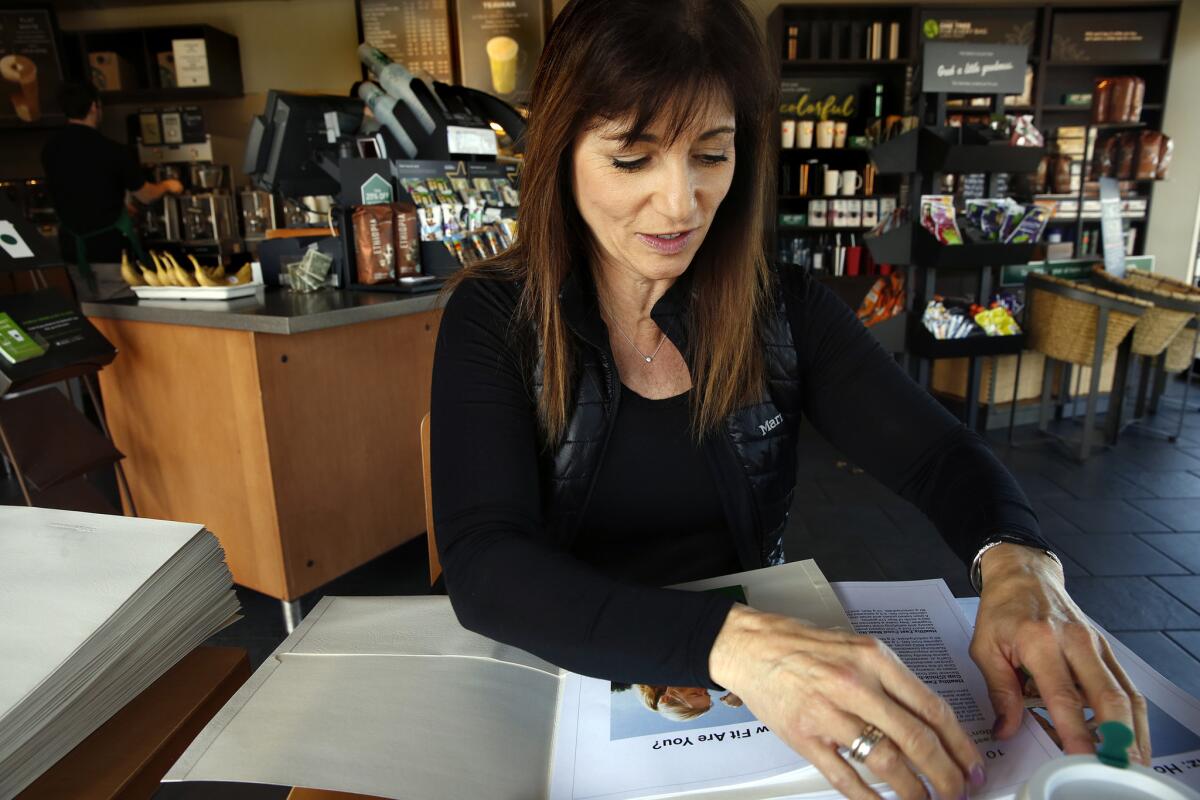
Four years ago, Hayes was convinced Mitt Romney could fix what was wrong with the country, but was dismayed to see him run such a weak campaign that she thought he practically handed the presidential election to Barack Obama. This time, she’s looking for somebody who takes charge. She’s voting for Donald Trump.
“The last eight years, we’ve been an un-babysat nation,” Hayes said. “We’re not being cared for as a people. The president has just turned his back on us.”
Hayes had company in Virginia’s primary election last month, when Trump captured the biggest share of Republican votes, with 34.7% of the vote.
Spotsylvania is a rural Southern county, transforming into an exurb. Increasingly, residents who commute to closer-in suburbs or cities have settled here, seeking affordable homes or a quieter lifestyle.

Trump’s Virginia
March 1 primary results
Alexandria
By county
Spotsylvania
County
Trump
Rubio
Richmond
Virginia Beach
Unemployment rate 2014
By county
More than 8%
6-8%
Less than 6%
Foreign-born population (2010-14)
By congressional district
Less than 12%
More than 18%
2012 election results
By county
Romney
Obama
Sources: Associated Press, Census
Bureau, Bureau of Labor Statistics
@latimesgraphics
Unlike the trio of counties around Washington, D.C., that have become the Democratic Party’s growing power base in Virginia, Spotsylvania remains consistently Republican, and defiantly anti-establishment. Two years ago, residents here helped oust one of the most powerful Republicans in Congress, Eric Cantor, because voters thought he had gone Washington.
The counties closest to the nation’s capital — with larger minority populations, younger voters and more direct ties to the federal government — were among the handful where Republican primary voters chose Marco Rubio in March; Trump dominated counties in the south, often with margins well above 50%; in Spotsylvania County, Trump took 37.5% of the vote.
Though her job takes her into mansions, Hayes makes $35,000 to $45,000 a year, and collects an extra $12,000 by renting part of her house out to a military couple.
But her mortgage and car payments cost more than $1,800 a month. She is constantly fretting over her scant retirement savings.
“In technical terms, I should be closer to retirement,” she said. “That’s not even an option right now.”
Hayes moves at a frenetic speed, relying on a green appointment book to figure out where she belongs every moment; she uses Starbucks as a makeshift office.
She lives in a white, two-story home on a cul-de-sac just outside of Fredericksburg, about 13 miles from Spotsylvania County. The house is a constant hive.
There’s the couple in the basement. There are clients training in the gym she built in the garage.
Her three grown children stop by, to leave their dog or car or, in the case of her son the college student, to borrow money to attend a wrestling match in Ohio.
See the most-read stories this hour >>
Despite her interest in health, Hayes said she went seven years without insurance. Then, four or five years ago, she found a policy that cost just $269 a month. It had a very high deductible, so it would cover only the most catastrophic illness or injury.
But it was canceled after Obama’s health law forced insurers to stop offering some plans that did not offer a full spectrum of coverage. Hayes said she ultimately chose to pay an annual penalty instead of shelling out for a more costly policy.
“You’re always running that risk of one illness, one injury that could put you in a really bad place,” she said.
Though Hayes is upset by the state of the nation and the world, she is usually laughing. On a recent Tuesday morning, she teased her middle daughter Josie, the manager of a GameStop video game store in Richmond, about the deer tattoo on her arm. Hayes is close with Josie’s transgender roommate and considers herself a liberal on social issues.
Hayes looked at other presidential candidates — including Texas Sen. Ted Cruz and New Jersey Gov. Chris Christie — but was drawn to Trump early because of his ability to force others to respond on his terms.
“He’s taking the mask off the entire political system,” she said. “We don’t have a voice anymore. You feel like you’re watching the United States being represented in a way that we never anticipated, nor asked for.”
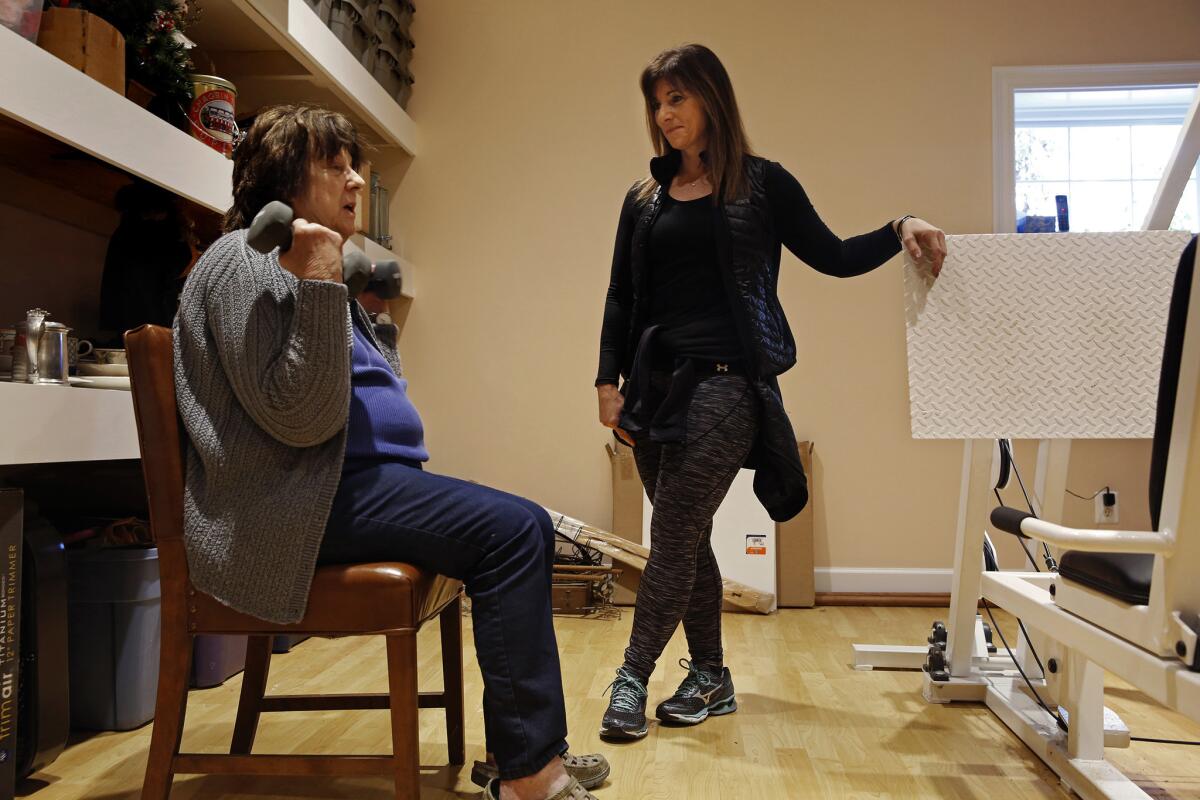
On a recent Monday morning, Hayes drove past miles of cellphone stores, big-box retailers, and churches. In the middle of a wooded national park, she entered a gated community to meet one of her favorite clients, Mary Jane King.
King and her husband Alfred, both in their 80s, helped Hayes figure out how to keep her house 13 years ago when she got divorced, lending her financial advice and resolve. They also helped shape her political awakening. Hayes had voted on and off for Republican presidential candidates since the 1980s. Then, in 2007, she helped a Democratic friend in a losing bid for a state house seat.
As she began looking at national issues — especially taxes and the Affordable Care Act — she realized that she was really more conservative than she had thought.
The Kings like to talk politics with Hayes. Alfred is a semi-retired business appraiser with a pair of Harvard degrees who recently took over the county Republican Party. Mary Jane is a former owner of a flower shop who formed a local women’s conservative group because she thought the existing one was too timid.
“You talk about government? Don’t ask me. I have nothing good to say,” Mary Jane said. “I despise this government.”
Both helped raise money for Rep. Dave Brat, who was an unknown college professor two years ago when he shocked Washington by ousting Cantor, the House majority leader who hailed from the 7th Congressional District that includes Spotsylvania County, in a Republican primary.
Cantor’s loss was a preview to Trump’s rise, and a warning that conservative voters felt their anger was not being taken seriously. To the Kings, Cantor was emblematic of an establishment that had grown detached and arrogant. Brat attacked Cantor for being weak on immigration.
And immigration — and the growing visibility of Muslims in the area — has been a big concern for the Kings.
Mary Jane King was at the local zoning meeting in November to oppose the mosque expansion.
“All these women, with their burkas, standing around,” she said. “That just didn’t sit well with us.”
Though there is little evidence that the local Muslim community is growing substantially, King is deeply suspicious, and believes the mainstream media is not reporting all the news.
“Obama’s bringing Muslims here into Spotsylvania,” she said. “I don’t know where. But he’s giving them housing and setting them up.”
A spokesman for Virginia Gov. Terry McAuliffe said 13 Syrian refugees have resettled in the state since the current budget year began in July, none in Spotsylvania County.
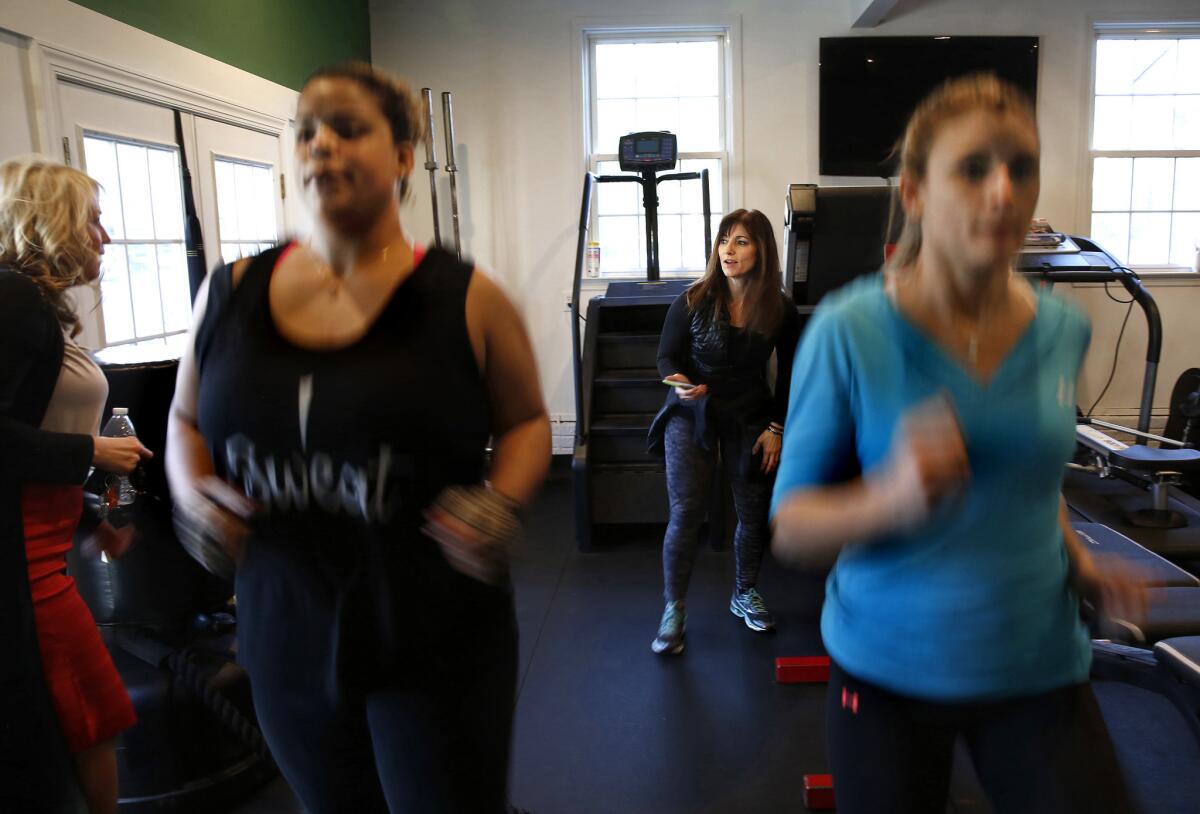
Hayes said later that she understands the fear but believes the mosque should be allowed to expand. She doesn’t think local Muslims pose any security threat, and she feels sympathy for Syrian refugees. But she also agrees with Trump that there should be at least a temporary ban on Muslims entering the country.
“I’d be the Mother Teresa of them. But how do we do that as a country?” Hayes said. “We need to slow things down.”
A day later, Hayes awoke at 4:30 a.m. to teach a boot camp at a local gym. It was the morning that militants, later identified as Islamic State affiliates, killed dozens of people in Brussels. Hayes was glued to her phone and the televisions scattered among the workout machines, all tuned to the news. Everyone was a bit numb.
“It keeps happening,” she said.
ALSO
Results from the Virginia primary
An illustrated visit to Trump Nation
'We need an outsider like Trump,' says this two-time Obama voter
Sign up for Essential California
The most important California stories and recommendations in your inbox every morning.
You may occasionally receive promotional content from the Los Angeles Times.









